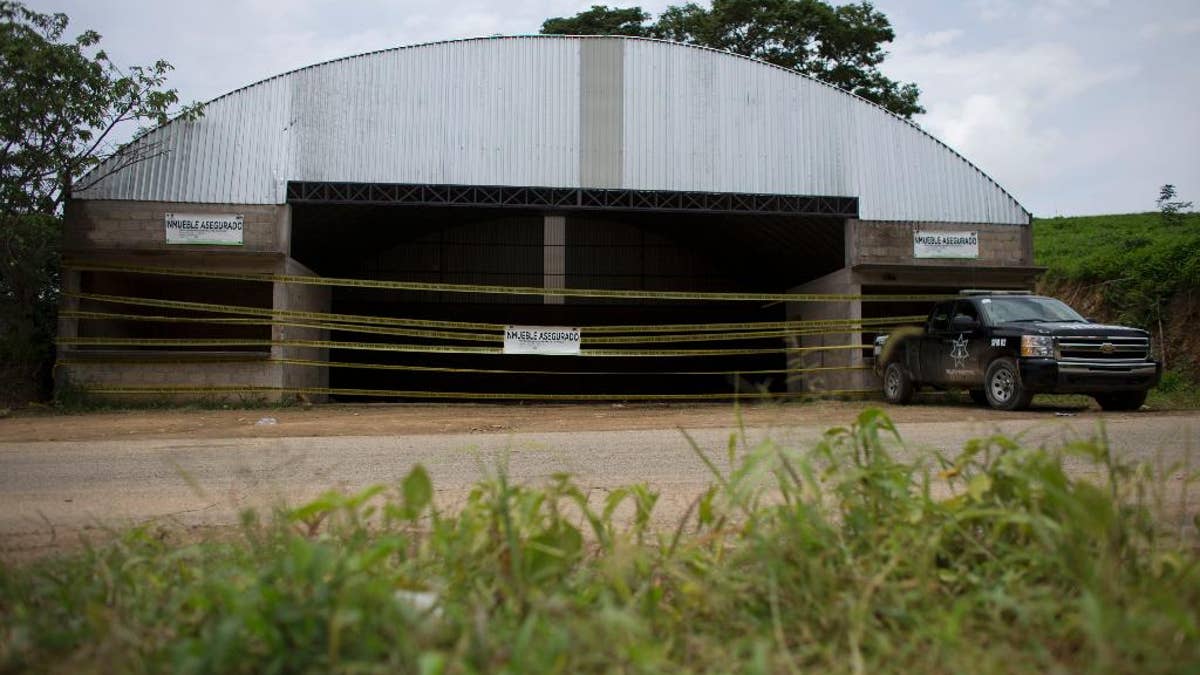
FILE - This July 3, 2014 file photo shows the warehouse where 22 alleged gang members were killed by soldiers on the outskirts of the village of San Pedro Limon, in Mexico state, Mexico. One year after soldiers executed as many as 15 suspects at a grain warehouse in southern Mexico, many say justice has still not been done. Human rights groups said Tuesday, June 30, 2015, the Mexican government must clear up the truth about what happened on June 30 2014. (AP Photo/Rebecca Blackwell, File) (The Associated Press)
MEXICO CITY – One year after soldiers killed as many as 15 suspects at a grain warehouse in southern Mexico, many say justice has still not been done.
None of the seven soldiers detained has been convicted in the case and only one victim's family has received government reparation payments.
None of the detectives and prosecution agents accused of covering up the case by torturing survivors has been fired. None has been charged, although about 20 remain under investigation, the Mexico State prosecutors' office said.
The case against the soldiers has been so slow that even Defense Secretary Gen. Salvador Cienfuegos is frustrated. "The request is for the trial to start," Cienfuegos told the newspaper El Universal. "I think there has been enough time for this to take place, and be wrapped up."
In November, three soldiers were charged with aggravated homicide and four others, including a lieutenant, were charged with "actions improper to the public service" for failing to report the killings. Mexico's creaky legal system, changes in the defense team and slowness by prosecutors are all believed to have contributed to the slowness.
But the State of Mexico, where the killings occurred, has done a number of about-faces, first praising the army for confronting the suspects, who were believed to be members of a criminal gang.
Three women who survived the brief initial shootout and subsequent executions said they were tortured and threatened by state prosecutor's agents to support the army's version. But none of those agents have been fired or charged, though the prosecutors' office said in a statement that the investigation is close to being wrapped up.
The three survivors are not yet eligible for reparation payments, though one lost her daughter in the shootings and the two others spent months in jail on weapons charges that were later dropped.
The state government said it is considering payments to the women, while the federal Commission for the Attention of Victims will pay about $3.2 million to the families of the 22 victims. Between 12 and 15 were either unarmed or had surrendered when shot, autopsies revealed. But only one family has received payment so far.
The killings, known as the "Tlatlaya case" after the rural township where they occurred, were first brought to light by an Associated Press story in July revealing apparent contradictions in the army's account. The case was serious enough to be cited in the U.S. State Department's 2014 Country Reports on Human Rights Practices. That report said that "significant human rights-related problems included police and military involvement in serious abuses, such as unlawful killings, torture, disappearances, and physical abuse. "
Rights groups say the government has to do more to get to the bottom of the case; there are still unanswered questions about how far up the chain of command the killings, and subsequent cover-up, went.
"It is fundamental that all military personnel responsible, including by chain of command, be brought to justice," wrote Perseo Quiroz, director of Amnesty International Mexico.
"Only once it acknowledges the magnitude of the problem, can the Mexican government begin to effectively address it." Jose Miguel Vivanco, Americas director for Human Rights Watch.
